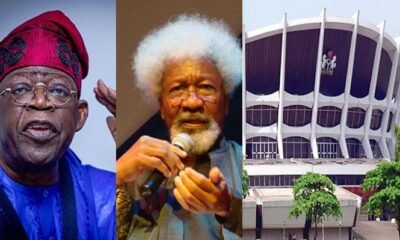Politics
How Mko Abiola Was Arrested, Imprisoned And Killed


Late M.K. O Abiola
The recent gesture of the Federal Government of Nigeria, re-designating June 12, as the country’s democracy day, has stirred, not only controversy, but also fresh interest over the man who made that day what it has turned out to be – a day to reckon with in history.
That man is Alhaji Moshood Kashimawo, Abiola, who ran that election under the platform of the Social Democratic Party (SDP), with Ambassador Babagana Kingibe as his running mate. He was coasting home to victory in the election, the first since the 1983 military coup, before the military government led by General Ibrahim Badamasi Babangida decided to annul it.
Many things made the annulment a bitter pill, but most importantly was because it was considered the freest and fairest election in contemporary Nigerian history. So many international and local observer participated or observed the proceedings before arriving at their conclusion, yet the military government would not allow it to be. But worse was that the winner eventually paid with his life.

..Babangida
Before then, Babangida had risen to the defence of the military heirrachy citing several reasons why the election was annulled.
We quote in part some what he said were the main reasons for the controversial action:
‘’There were allegations of irregularities and other acts of bad conduct leveled against the presidential candidates but NEC (National Electoral Commission as the election umpire was then called) went ahead and cleared them.
There were proofs as well as documented evidence of widespread use of money during the party primaries as well as the presidential election. These were the same bad conduct for which the party presidential primaries of 1992 were cancelled. Evidence available to government put the total amount of money spent by the presidential candidates at over two billion, one hundred million naira (N2.1 billion). The use of money was again the major source of undermining the electoral process. Both these allegations and evidence were known to the National Defence and Security Council before the holding of the June 12, 1993 election, the National Defence and Security Council overlooked these areas of problems in its determination to fulfill the promise to hand over to an elected president on due date.
Apart from the tremendous negative use of money during the party primaries and presidential election, there were moral issues which were also overlooked by the Defence and National Security Council. There were cases of documented and confirmed conflict of interest between the government and both presidential candidates which would compromise their positions and responsibilities were they to become president.
If he though he would stay to complete his agenda, he was totally wrong for the crisis the eventually followed, created a gulf in the military leadership, and a national political crisis which created opportunity General Sani Abacha to seize power.

..Abacha
Of course, suggestions to Abiola as to the next line of action were not in short supply. He began a kind of shuttle diplomacy obviously to state his position and also take advice from. And in 1994 Abiola declared himself the lawful president of Nigeria in the Epetedo area of Lagos island,
The military promptly responded by declaring him wanted and accusing of treason. 200 vehicles were dispatched to arrest him. Unfortunately of his wives were assassinated while he was in detention for about four years.
It was a nationally trying period for the country Nigeria and the solidarity for Abiola and what he stood for was overwhelming. Series of prayers went on concerning his release and the validation what had become nationally and internationally know as the MKO Abiola mandate.
But then Abacha died in June 1998 while at the presidential villa in Abuja, fuelling speculations of various kind. And shortly after, Abiola died in equally suspicious circumstances on the day that he was due to be released, and this was on 7 July 1998.
Abacha’s Chief Security Officer, al-Mustapha was to allege later that the late politicians was in fact beaten to death. And as if to strengthen that strand of belief, the final autopsy report, which was produced by a group of international coroners is yet to be made public.


























